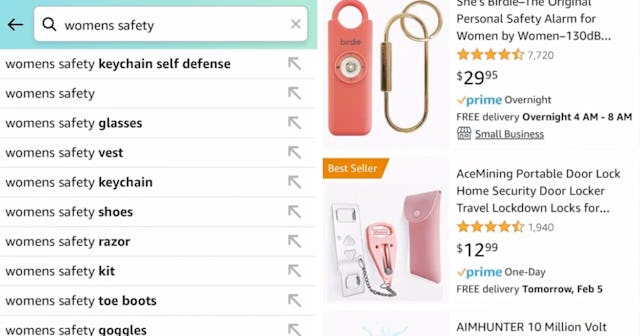A Woman’s Amazon Search Shows How Much More Women Have To Worry About Their Safety
“Men have to protect themselves against things falling on their feet, and women have to protect themselves against men,” she says.

There are 101 rules for women when it comes to staying safe (aka not getting abducted, assaulted, or worse). Don’t walk anywhere alone. Don’t have maintenance workers over to your house alone. Lock all your doors and windows. Be home by dark. The list goes on and on and on. I even have my food ordering apps under a man’s name because I often order food for me and my daughter when my husband is out of town.
Women have been programmed to always be on alert for danger, and it’s for a good reason. Statistics show that 90% of rape victims are women, while over 70% of domestic assault and homocide victims are women.
A 2019 research study found that most 61% of American women say they regularly take steps to avoid being sexually assaulted. Women are also more likely than men to say that they “always” or “often” feel unsafe participating in everyday activities like taking the bus, going on a first date, and going for a run.
Marketing has capitalized on this sad fact and produced product after product designed to help women protect themselves from a potential threat.
TikTok user Kim Senser showed this shocking gender safety gap — that many men don’t realize — with a simple Amazon search.
“If you wanna know the difference between what men and women think are dangerous, just look up ‘Women’s Safety’ on Amazon,” she says in her video, while showing a screen recording of her search results.
The search results are what any woman would expect: alarms to alert family, sirens that attach to a keychain, pepper spray, stun guns, flashlights, etc. Products that can help keep you safe out in the world.
If you’re asking yourself, wait, do men feel this same kind of impending doom every time they walk outside alone? You’re about to be sorely disappointed.
Senser then types “Men’s Safety” in the search field, and the results are almost so cringeworthy that you have to laugh (because if you don’t — you’ll cry).
The very first search result is actually for a “safe glide” face razor which is followed by protective glasses, reflective vests, and shoes.
“...because men have to protect themselves against things falling on their feet, and women have to protect themselves against men,” she says.
After over 700k views and over 100k likes, comments flooded in from women who shared in the OP’s frustration. One mom commented, “The way my head is on a swivel when putting my kid in her car seat. I don’t like my back being turned to the lot,” she wrote.
“We shouldn’t have to live like this,” Senser replied.
Another user wrote, “My husband not understanding why I don’t wanna take the dog out alone at 3am was all I needed to know about how men think.”
Research shows that 59% of women who walk down an alley alone always or often feel unsafe doing so while only 11% of men said they felt the same.
Women are at least twice as likely as men to always feel unsafe going to a stranger’s house alone (23% of women vs. 6% of men), taking a trip to a foreign country alone (24% vs 12%), or getting a taxi or ride-share by themselves (13% vs 4%).
Data also suggests roughly one in five (21%) women say that they always or often feel unsafe when going on a first date. Only 9% of men experience similar feelings.
Because women are always on alert with the risk of danger (typically while alone), they often do not go out solo while men seem to have little issue.
46% of women say that they’ve never been at a bar by themselves, while just 30% men say the same. 25% of women say they never walk alone at night, compared to a mere 8% of men who said the same.
From all these stats and just a simple Amazon search, it seems that being followed, harassed and assaulted are almost a universally shared experience between women and girls while the threats men are most worried about center around physically hurting themselves at work.
And it’s an issue that won’t be solved with pepper spray on a keychain — we have to work on it as a society and a culture.